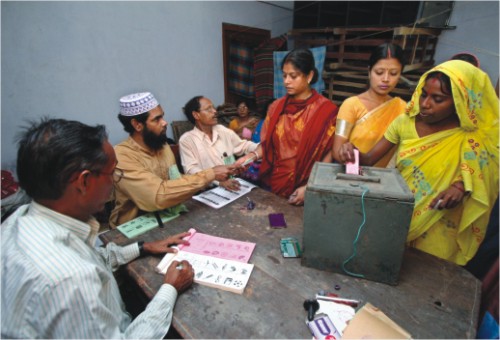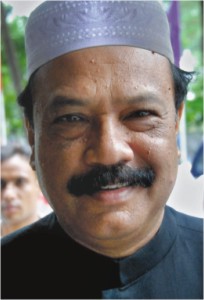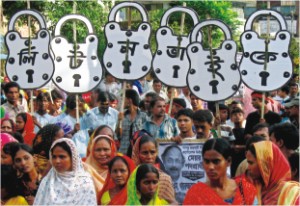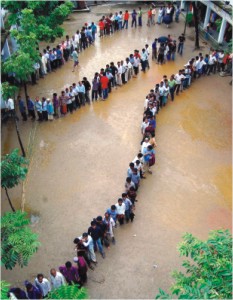
Inside
|
Political Reforms:
Rounaq Jahan wants to hear more from the political parties The prospects for political reforms, which appeared to be quite bright soon after the change of government on January 11, 2007, now appear to be rather dim. Despite repeated calls for a qualitative change in politics by the military-backed government of Dr. Fakhruddin Ahmed, the results of the city corporation elections held on August 4 this year demonstrated that old style politics and politicians are alive and well. The highly visible campaign for "honest and qualified" candidates launched and sustained by civil society and the media over the last several years, and the frequent public statements supporting the election of such candidates by the chief adviser, members of the Advisory Council and the army chief of staff, General Moeen U. Ahmed, have failed to make any visible impact on the electorate. Instead voters have decided to elect several candidates who have been imprisoned for their alleged corrupt activities. The re-election of Badruddin Ahmed Kamran from his prison cell, as the mayor of Sylhet, with a greater majority of votes than the previous election, was a sober reminder to advocates of "honest and qualified" candidates that such candidates cannot win an election exclusively on their own merit, and would need to draw on the support of the major political parties. Kamran had been imprisoned since May 29, 2007 on several graft cases, yet he was able to poll 115,446 votes against his nearest rival A.F.M. Kamal's 32,097 votes. Out of the 46 mayoral contestants for the four city corporation elections, 36 lost their deposits. Only those candidates who were supported by political parties, particularly the two major parties, the Awami League (AL) and the Bangladesh Nationalist Party (BNP), did not forfeit their deposits. The results of the August 4 elections thus underscored once again, the importance and the strength of the AL and the BNP as the two main players in our electoral politics. However political parties should not misread the election results as a popular verdict against clean politics and an endorsement of going back to politics as usual, marked by mastaans, money, corruption, and confrontation. They need to recognise that the idea of reforms, particularly the anti-corruption drive of the Fakhruddin government, initially had a lot of popular support but the government made a number of strategic mistakes in pushing the reforms agenda. The political parties, who now aspire to be at the helm of government after January 2009, need to be responsive to the demand for political reforms. The parties need to design, of their own volition, a comprehensive agenda of reforms which still retain a lot of popular support, particularly of civil society and the media, notwithstanding the election results. It will be a gross mistake if the parties think that they can go back to their old style politics that led to the break down of the rule of law and made all public institutions non-functional. The parties need to commit themselves to reforms and draw lessons from the mistakes of the post-1/11 government as to the "dos" and "donts" of how to promote reforms. Reforms need champions from inside and outside the government Reforms need to be sustained through continuous political mobilisation of support. They will always hurt the interests of powerful groups. In order to be successful, reformists need to build a coalition of majority support in favor of reforms and neutralise groups opposing them. Unfortunately, the military-backed Fakhruddin government was not able to neutralise the opponents and build visible support of powerful groups for the reforms. In fact, over time the voice of the supporters of reforms outside the government started to become weak. We should remember that the call for political reforms is not a new agenda which was initiated by the post-1/11 government. In fact, academics, civil society, and the media have been advocating for political reforms for over a decade. Political parties have also called for reforms. The most comprehensive reforms agenda was put forth by the Awami League (AL)-led 14 party alliance in 2005, when it announced a 31 point program. The 31 point program embraced a number of reforms proposed by civil society and the media, including a pledge towards clean politics, and eliminating the influence of black money and mastaans.
In addition, it moved beyond the call for clean politics and candidates, which was the top agenda of civil society and the media, to commit the alliance to non-communal and secular politics. The 31 points ignited great hopes amongst reformists in civil society and the media, that finally one major political force would be responsive to their long standing demands for political reforms. But later, many became disillusioned when the AL entered into a pre-electoral alliance with an Islamist party and some of their nominees for the scheduled 2007 elections were alleged to be corrupt. Though the AL-led 14 party alliance embraced the reforms agenda, there appeared to be some differences between the political and civil society forces on reform items. For example, in calling for "a level playing field" for free and fair elections, the AL-led 14 party alliance highlighted the importance of removing the partisan influence of state machinery on the electoral process; civil society forces in contrast, emphasised the importance of removing the influence of money and mastaans, so that honest politicians would have a reasonable chance of winning a free and fair election.
However, after the change of government on January 11, 2007, the reforms agenda suddenly became a government agenda. The military-backed Fakhruddin government became increasingly vocal on the need for governance and political reforms. But while the voice of the government became louder, the voice of the reform advocates outside the government, in civil society and the media, became increasingly subdued. There did not seem to be any coherence between the champions of reforms inside and outside the government, which is essential for successful implementation of reforms. The voice of reformists within civil society and the media became muted for a variety of reasons. They became increasingly unsure and skeptical of the real agenda of the government, particularly its military backers. Early on, General Moeen U. Ahmed talked about our "own brand of democracy," which was reminiscent of Pakistan's first military dictator, Ayub Khan's pledge of introducing a political system which was to be a "home grown plant" suited to the "genius of the people." Later, several other reform ideas such as the balance of power between the prime minister and the president, a national security council, and a national government were floated. These ideas increased the apprehension of civil society reform advocates because they feared that these steps would weaken the mandate of the future elected government. The idea of balance of power between the prime minister and the president did not foster a system of democratic checks and balance in Pakistan. Instead, it created opportunities for the president to fire elected prime ministers, which resulted in political instability. The rationale for the idea of a national security council, floated by General Ershad in the 1980s, was not clear, as institutionalising the role of the military in political decision-making is not considered to be good for strengthening democracy. The idea of forming a national government created confusion as to the timing and purpose of such a government. There was apprehension that it would emerge as a surrogate for the elected government. Reforms require changing systems and not just individuals The drive to democratise the functioning of political parties suffered from similar emphasis on individuals, with less conversation about what rules and processes need to change in order to make decision-making within political parties more democratic. The focus on removing the "two ladies" did not work, because the so called "reformists" within the two parties did not inspire any confidence, in that they could bring about any qualitative change in politics. After all, the "reformists" had been part of the old system and had survived and thrived under the old system. This predominant focus on individuals and personalities took much energy and time from starting a national conversation about what rules and regulations, incentives, and disincentives were needed, and what changes were required to reform our institutions. Such a dialogue would have widened the constituency base of support for reforms, as it would focus on changing institutions and rules rather than replacing individuals.
As we have barely four months left before the promised December 2008 national elections, it is important that the agenda of political reforms is again taken up seriously by political parties, civil society, and the media. As noted earlier, reforms happen when we have reform champions both inside the government and outside. Civil society and the media are the outside voices who can advocate and mobilise support for reforms. But, it is urgent that political parties who seem to be only pre-occupied with elections, also take leadership on the reforms agenda. They need to tell us how they will bring about political and institutional reforms to strengthen democracy if they are elected to power. In the absence of such a pro-active move by the political parties, many in civil society, media, and citizens at large will remain skeptical about the capacity of the political parties to act as vehicles of change. The box on this page continues to highlight the issues which should rightly be addressed by the political parties. To conclude, reforms are an imperative not because they are demanded by civil society, media, or any other group. They are an imperative because our laws and institutions have broken down and we need to fix them. In a highly competitive globalised world, we run the risk of falling behind if we do not reform our dysfunctional political system. We want to live in a country which is governed by laws and institutions where we can freely elect representatives to rule on our behalf but at the same time we can expect them to be responsible and accountable to us. Since we want political parties to represent us, and they remain, in our prevailing circumstances, the only agents for reform available to us, we expect to hear of their plans on the above issues. Priority Issues · Rule of law Dr. Rounaq Jahan is a Senior Research Scholar and Adjunct Professor of International Affairs in the School of International and Public Affairs of Columbia University, New York, USA. |



